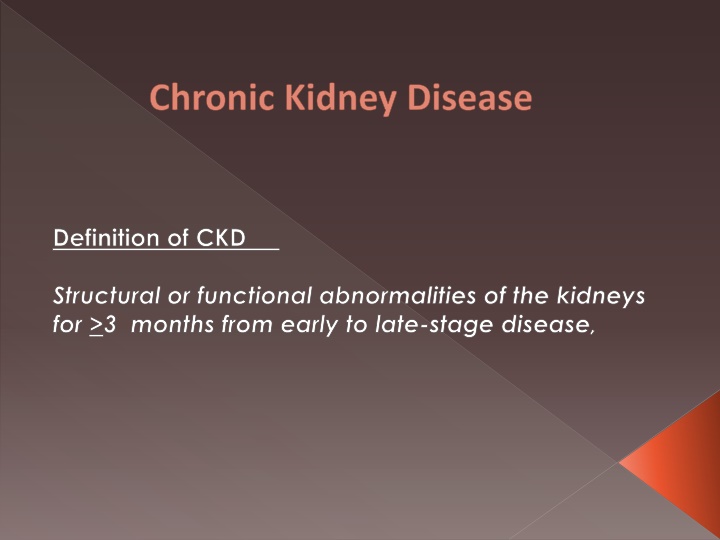
Understanding Chronic Kidney Disease: Causes, Symptoms, and Management
Chronic Kidney Disease (CKD) is a condition characterized by structural or functional abnormalities of the kidneys for more than 3 months, progressing from early to late-stage disease. CKD may manifest as kidney damage with decreased GFR or GFR
Download Presentation

Please find below an Image/Link to download the presentation.
The content on the website is provided AS IS for your information and personal use only. It may not be sold, licensed, or shared on other websites without obtaining consent from the author. If you encounter any issues during the download, it is possible that the publisher has removed the file from their server.
You are allowed to download the files provided on this website for personal or commercial use, subject to the condition that they are used lawfully. All files are the property of their respective owners.
The content on the website is provided AS IS for your information and personal use only. It may not be sold, licensed, or shared on other websites without obtaining consent from the author.
E N D
Presentation Transcript
Chronic Kidney Disease Definition of CKD Structural or functional abnormalities of the kidneys for >3 months from early to late-stage disease,
Chronic Kidney Disease as manifested by either: 1. Kidney damage, with or without decreased GFR, as defined by pathologic abnormalities markers of kidney damage, including abnormalities in the composition of the blood or urine or abnormalities in imaging tests
Chronic Kidney Disease 2. GFR <60 ml/min/1.73 m2, with or without kidney damage Estimated glomerular filtration rates (eGFR) range from 90 mL/minute/1.73 m2 in the early stages to 15 mL/minute/1.73 m2 in the late stages of disease is known as end-stage renal disease (ESRD). Complications include fluid and electrolyte abnormalities, anemia, cardiovascular disease, hyperparathyroidism, bone disease, and malnutrition.
Chronic Kidney Disease Patients with ESRD require renal replacement therapy in the form of dialysis or transplantation to sustain life. The prevalence of chronic kidney disease (CKD) increases with age and is greater in females and some ethnic populations. CKD is classified according to severity from 1 to 5, where 5 is the most advanced and 1 the least.
Chronic Kidney Disease The renin-angiotensin-aldosterone system (RAAS) Most of the renal effects of this system are through regulating intraglomerular pressures and salt and water balance. First, In patients with CKD, intra-renal pressures are often low and sympathetic overactivity is common; lead to increased renin secretion. .
Chronic Kidney Disease This can occur with normal or elevated systemic blood pressure. this promote production of the mineralocorticoid hormone aldosterone, and promotes antidiuretic hormone (ADH) release, In combination, these lead to salt and fluid retention, high intravascular volumes, hypertension and oedema.
Chronic Kidney Disease Second, a direct vasoconstrictor and promotes systemic and (preferential) renal hypertension on the efferent glomerular arteriole. Vasoconstriction at this site is mediated by a high density of angiotensin II receptors. When these receptors are ligated by angiotensin II, there is increased intra- glomerular pressures.
Chronic Kidney Disease Whilst this leads to an overall increase in GFR in the short-term, over a longer period glomerular hypertension promotes accelerated glomerular scarring and worsening CKD.
Chronic Kidney Disease In addition there is a local immune modulatory role for this system. Both resident (e.g. tubular epithelial) cells and inflammatory (monocytes and macrophages) cells, they express the angiotensin II receptor and activation through this receptor leads to an enhanced inflammatory and fibrotic phenotype of the cell.
Chronic Kidney Disease Measurement of renal function Serum creatinine This becomes important in advanced CKD (stages 4 and 5) and limits the value of measuring serum creatinine to determine renal function in advanced CKD
Chronic Kidney Disease Glomerular filtration rate equation Eight eGFR equations were validated for the MDRD(Modification of Diet in Renal Disease Study) equation eGFR (mL/min/1.73m2) = 186 x [serum creatinine ( mol/L)/88.4] 1.154 x [age] 0.203 x [0.742 if female] x [1.212 if African-American]
Chronic Kidney Disease Creatinine clearance Measurements of creatinine clearance (ClCr) require accurate collection of 24 h urine samples with a serum creatinine sample midway through this period. Fig. 18.3 Creatinine clearance calculation
Chronic Kidney Disease Cockroft Gault equation The Cockroft Gault equation uses weight, sex and age to estimate creatinine clearance and was derived using average population data Fig. 18.4 The Cockroft Gault formula.
Chronic Kidney Disease Estimates of glomerular filtration rate in paediatric patients Using the Schwartz formula or the Counahan Barratt method which both rely upon inclusion of the height of the child in estimating creatinine clearance, since height correlates with muscle mass.
Chronic Kidney Disease Urea Urea is also used in the assessment of renal function despite a variable production rate and diurnal fluctuation in response to the protein content of the diet it may also be elevated by dehydration or an increase in protein catabolism such as that accompanying gastro-intestinal haemorrhage, severe infection, trauma (including surgery) and high-dose steroid therapy. Serum urea levels are, therefore, an unreliable measure of renal function, but can be used as an indicator of the patient's general condition and state of hydration.
Chronic Kidney Disease Stages of Chronic Kidney Disease
Chronic Kidney Disease Significance of CKD CKD is of progression to end-stage renal disease, and a strong association with accelerated cardiovascular disease, similar in diabetics. Patients with CKD 1 3 are frequently asymptomatic. The reduction of GFR is insufficient to cause uraemic symptoms and any minor abnormalities in the urine such as proteinuria or haematuria .
Chronic Kidney Disease There is association with high blood pressure which may be the cause or a consequence of renal damage. as it allows early modification of cardiovascular risk factors Patients with CKD stages 4 and 5 require specialist management of the complications of CKD such as anaemia and bone disease, whilst many will be undergoing preparation for renal replacement therapy.
Chronic Kidney Disease Causes of CKD Ischaemic nephropathy has traditionally Vascular diseases (renal artery disease, hypertension, microangiopathy) been referred to under perfusion of the kidneys Diabetes mellitus (Diabetic Kidney Disease) is the most common metabolic disease that leads to CKD, whilst the predominant lesion is glomerular and referred to as diabetic nephropathy.
Chronic Kidney Disease All types of chronic glomerulonephritis (GN) or Glomerular diseases (autoimmune diseases, systemic infections, drugs, neoplasia) cause about 15% of cases of advanced CKD. Lower urinary tract disease or Tubulointerstitial diseases (urinary tract infection, stones, obstruction, drug toxicity) they represent 5 10% of all cases of CKD.
Chronic Kidney Disease Hereditary/congenital diseases / Cystic diseases (polycystic kidney disease) they represent 5% of CKD cases CKD to be unknown and this is the case in around 30% of patients who typically present with small kidneys and unremarkable immunological investigations.






















